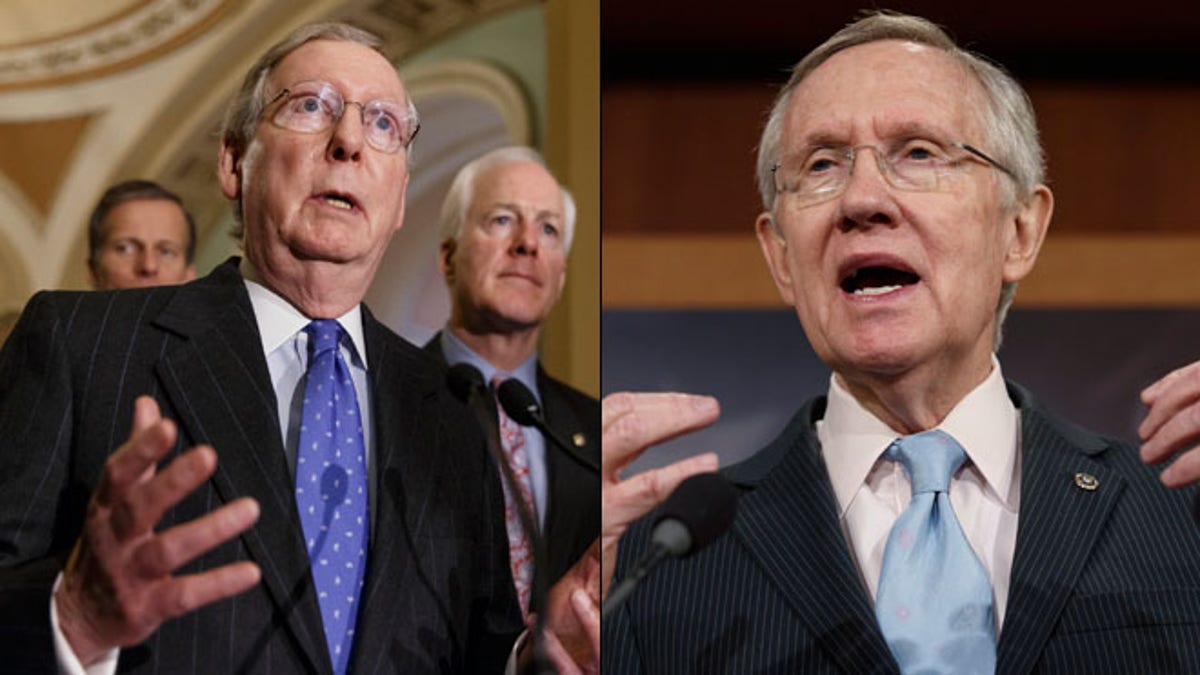
Shown here are Senate Republican Leader Mitch McConnell, left, and Democratic Leader Harry Reid. (AP)
Call it "electionitis." The specter of November midterms, in which every member of the House and one-third of the nation's senators are up for re-election, is coloring just about everything that's happening -- and not happening -- on Capitol Hill these days.
As a sweeping veterans' bill remained stalled before the Senate, Majority Leader Harry Reid took to the floor Wednesday to blast as "un-American" the Koch brothers, conservative mega-donors pumping billions into anti-ObamaCare ads in the backyards of several of Reid's vulnerable colleagues in red-leaning states. Meanwhile, across the Capitol, the GOP-controlled House trumpeted a "Stop Government Abuse" week that entailed passage of purely symbolic bills aimed at reining in the administration. President Obama already has vowed to veto the bills.
It's not that Congress is lacking in substantive issues to consider. House Ways and Means Committee Chairman Dave Camp, a Michigan Republican, this week unveiled an outline of a plan to reform the nation's tax code -- a long-touted goal of both parties as well as the White House -- that would lower overall rates for individual and businesses while rolling back popular deductions. But the proposal, which also calls for a new tax on large banks, is having trouble gaining traction even in the GOP.
"Electionitis" appears to have set in.
Asked about the prospect of tax reform this year, GOP Leader Mitch McConnell didn't hesitate to throw cold water on the idea, saying he saw "no hope" of it succeeding unless Republicans wrest control of the Senate. Even House Speaker Boehner refused to endorse the Camp proposal, only going so far as to say he welcomes the conversation. (Camp's plan didn't fare much better among Democrats; Sen. Chuck Schumer of New York called it "dead on arrival" in a statement.)
Action on the usually bipartisan-friendly issue of veterans' benefits also ground to a halt as some Republican senators are threatening to hold up a sweeping bill sponsored by Veterans Affairs Committee Chairman Bernie Sanders, I-Vt., unless they get a vote on an alternative that would include an Iran sanctions provision. A bipartisan majority of senators supports a bill that would impose another round of sanctions if the country fails to follow through on its pledges during bilateral negotiations, but Reid has blocked it from a vote out of deference to the White House. Yet again, the Nevada Democrat finds himself in a tough spot -- facing the risk of sinking the legislation, which will need Republican votes to clear another procedural hurdle, or of disobeying the White House.
Indeed, sanctions are but one topic where party unity is elusive, even in an election year. A new Senate Democratic effort aimed at shoring up public perceptions of ObamaCare was revealing as not a single red-state Democratic senator on the ballot this year took part in the campaign's kickoff press conference. Elsewhere, while House Democrats charged ahead with a discharge petition to try and force Boehner to bring a minimum wage hike to the floor, a similar measure has been postponed in the Senate as Reid struggles to find the votes to advance it.
So, with big-ticket items seemingly off the table, what's a Congress to do? Republicans have refused to let up on Obama administration missteps on health care or the IRS. The fact it is dead on arrival in the Senate didn't stop the House from pushing through, for example, legislation that would curb IRS rules on the political activities of tax-exempt organizations. GOP lawmakers have also subpoenaed former IRS official Lois Lerner to return to the Hill, despite protests from her lawyer.
For their part, the last few days have seen more attempts by Democrats at self-inoculation ahead of the midterms. Beyond the Senate Democratic campaign to portray ObamaCare's impact on seniors in a positive light, House leaders registered their dissatisfaction with what Democratic Whip Steny Hoyer dismissed as a "do-nothing" agenda.












































